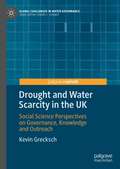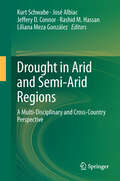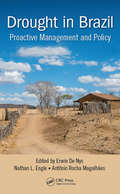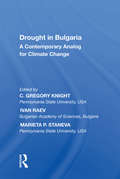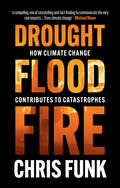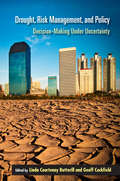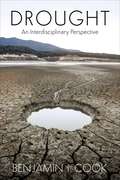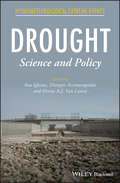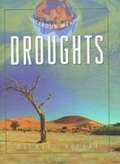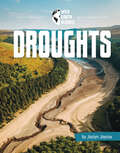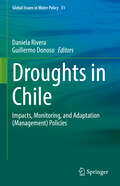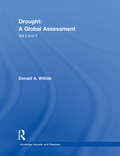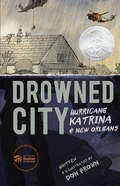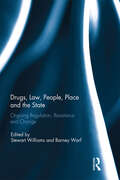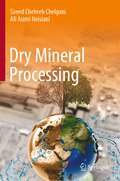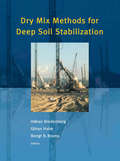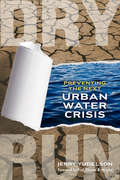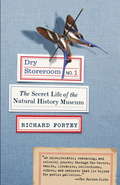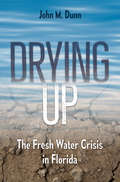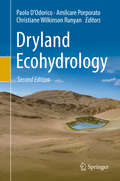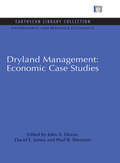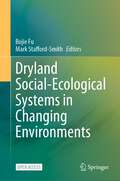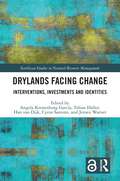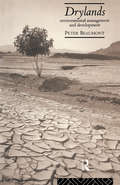- Table View
- List View
Drought and Water Scarcity in the UK: Social Science Perspectives on Governance, Knowledge and Outreach (Global Challenges in Water Governance)
by Kevin GreckschThis book presents a social science perspective on drought and water scarcity in the UK. It puts forward a narrative of how different stakeholders manage drought and water scarcity, how they generate and manage knowledge and how power relationships between stakeholders shape drought and water scarcity management. The book begins with an analysis and critique of all water resources management plans produced by English and Welsh water supply companies for the period 2014-2019 and introduces a novel typology for drought management options. It then moves on to discuss the effect of drought and water scarcity on businesses and production processes as well as how knowledge about drought and water scarcity is generated, by whom and for what purpose. Ultimately the book argues for the urgent need to engage people in the UK about water issues and offers a novel perspective on how to communicate and engage with drought research.
Drought in Arid and Semi-Arid Regions: A Multi-Disciplinary and Cross-Country Perspective
by Rashid M. Hassan Kurt Schwabe Jeffery Connor José Albiac Liliana Meza GonzálezOffering a cross-country examination and comparison of drought awareness and experience, this book shows how scientists, water managers, and policy makers approach drought and water scarcity in arid and semi-arid regions of Spain, Mexico, Australia, South Africa and the United States.
Drought in Brazil: Proactive Management and Policy (Drought and Water Crises)
by Erwin De Nys, Nathan L. Engle & Antônio Rocha MagalhãesDrought is a slow-onset natural hazard that is often referred to as a creeping phenomenon. The challenge of monitoring drought’s onset and evolution, and identifying its termination or end is one that scientists, natural resource managers, and decision makers have been struggling with for decades. However, drought management must be aimed at reducing the risks of future drought events on economies, the environment, and the social fabric of regions. As with many countries, droughts are often managed as a crisis in Brazil, rather than events for which officials and communities proactively prepare. Although droughts are not new to Brazil, the recent spate of droughts in the poverty stricken semi-arid Northeast and the industrial hub of São Paulo in the Southeast has forced the country to think more seriously about finally changing its drought policies and management approaches. The book is told through the perspectives of the ministers and secretaries, state policy and technical officials, civil society organizations, and development practitioners that helped to facilitate the shift in paradigm in Brazil from crisis management and towards proactive management of droughts. It is written in a style that is appealing to both technical and non-technical audiences, and aims to provide a framework and lessons for other countries to consider when embarking upon similar efforts to improve their own drought policy and management systems.
Drought in Bulgaria: A Contemporary Analog for Climate Change (Ashgate Studies In Environmental Policy And Practice)
by Ivan RaevGiven the different geographical and human contexts in which climate change impacts will be experienced, thinking by analogy provides one useful way to explore dimensions of such change. This landmark book, based on the human dimensions of global change paradigm, examines climate impacts through the study of a contemporary society's response to a drought period analogous to expected future climate. Bulgaria suffered severe drought from 1982 to 1994, conditions which models suggest better reflects future climate than existing norms. The Center for Integrated Regional Assessment at Penn State and the Bulgarian Academy of Sciences collaborated to research this drought period as an analogy for future climate. This book shows their assessment of what can be learned from the impacts of and responses to contemporary drought in Bulgaria. It therefore makes an important contribution to the literature on regional climate change and methods used to address anticipated impacts of that change.
Drought, Flood, Fire: How Climate Change Contributes to Catastrophes
by Chris C. FunkEvery year, droughts, floods, and fires impact hundreds of millions of people and cause massive economic losses. Climate change is making these catastrophes more dangerous. Now. Not in the future: NOW. This book describes how and why climate change is already fomenting dire consequences, and will certainly make climate disasters worse in the near future. Chris C. Funk combines the latest science with compelling stories, providing a timely, accessible, and beautifully-written synopsis of this critical topic. The book describes our unique and fragile Earth system, and the negative impacts humans are having on our support systems. It then examines recent disasters, including heat waves, extreme precipitation, hurricanes, fires, El Niños and La Niñas, and their human consequences. By clearly describing the dangerous impacts that are already occurring, Funk provides a clarion call for social change, yet also conveys the beauty and wonder of our planet, and hope for our collective future.
Drought, Risk Management, and Policy: Decision-Making Under Uncertainty (Drought and Water Crises)
by Linda Courtenay Botterill Geoff CockfieldAustralia and the United States face very similar challenges in dealing with drought. Both countries cover a range of biophysical conditions, both are federations that provide considerable responsibility to state governments for water and land management, and both face the challenges in balancing rural industry and urban development, especially in
Drought: An Interdisciplinary Perspective
by Ben CookWater is fundamental to all life. From the Dust Bowl of the 1930s, to the extreme water shortages that have struck California in recent years, modern societies often take its abundance for granted until it unexpectedly becomes scarce. Drought is one of the many problems anthropogenic climate change may exacerbate, but it is also a complex phenomenon at the intersection of a range of scientific disciplines and public policy issues. In this innovative book, Benjamin I. Cook brings together climate science, hydrology, and ecology to provide a synthetic overview of drought and its environmental and social consequences.Cook introduces readers to the hydroclimate and its components, explaining the global water cycle, the earth’s climate system, and the distribution of water resources. He discusses drought dynamics and variability over time, the climatological context and ecological effects, and environmental issues such as desertification, land degradation, and groundwater depletion. He also considers the socioeconomic impacts of drought and the role of drought risk management policy, especially in light of how climate change is expected to affect drought risk and severity. Cook gives special attention to paleoclimate and the role of drought in the crises of ancient civilizations. A scientifically comprehensive and approachable overview of water issues throughout the world, Drought is a critical interdisciplinary text that will be essential reading for a broad range of students in earth science and environmental and sustainability studies.
Drought: Science and Policy (Hydrometeorological Extreme Events #26)
by Ana IglesiasComprehensive coverage of understanding, prevention, and risk management of extreme drought events, with examples of approaches followed in water-stressed regions This book describes the progress made in our understanding of severe drought and explains how we can deal with—and even avoid—complete devastation brought on by such punishing events. It brings forward advanced knowledge on drought hazard analysis and management, particularly from EU-funded research projects, to assist in the development of the corresponding drought management plans. In addition, this book addresses issues of social vulnerability to drought and science-policy interfaces, which are important elements of drought management. Divided into three sections, this book covers the diagnosis of physical processes, historic drought and the trends in historic drought, and perspectives of future drought. It takes an academic approach to risk evaluation, including characterization of drought episodes, development of indicators of risk in hydrological and agricultural systems, and analysis of the role of socio-economic instruments for risk mitigation. It also discusses the interactions that have resulted in the complex institutional framework, and highlights the importance of stakeholder involvement and awareness building for successful drought management. In addition, Drought: Science and Policy features a collection of case studies that include the description of effective measures taken in the past. Addresses the growing issue of drought preparedness planning, monitoring, and mitigation Teaches methodologies and lessons focused on specific, drought-prone regions so the applications have more significance Provides examples of approaches followed in water-stressed regions (river basin and national scale) with drought analyses at the pan-European scale Drought: Science and Policy will be an invaluable reference for researchers and practitioners in the field as well as Masters students taking relevant courses in drought management and natural disaster management.
Droughts (Dangerous Weather)
by Michael AllabyDucks and geese fell from the sky, choked to death by the dust through which they flew. People called the storms "black blizzards." This was the Dust Bowl of the 1930s, site of one of the worst droughts in history. Perhaps the most insidious and terrifying form of dangerous weather, the absence of rain can bring slow, lingering death to crops, animals, and humans. In Droughts readers will discover why ordinary water is the most precious substance on earth; how global climate change might affect the frequency and severity of droughts; how droughts can occur anywhere; and how to use and conserve water wisely. Stories of droughts past and recent are also recounted. The Dangerous Weather series imparts fundamental weather science to readers through author Michael Allaby's vivid descriptions of extreme weather systems. The series focuses on the five most dangerous kinds of weather activity; diagrams related meteorological, climatological, and environmental basics in clear, compelling language; chronicles the history of each form of dangerous weather; and offers safety precautions for extreme weather conditions. Fully illustrated and indexed, the Dangerous Weather series is an invaluable tool for student research. Other volumes include: blizzards, hurricanes, floods, and tornadoes. Michael Allaby is the author of more than 40 books, mainly on science, natural history, ; environmental topics. A few of his previous works include Basics of Environmental Science, How It Works: The Environment, and The Concise Oxford Dictionary of Ecology. He is a member of the New York Academy of Sciences, among other professional affiliations.
Droughts (Let's-Read-and-Find-Out Science 2)
by Melissa StewartRead and find out about droughts in this colorfully illustrated nonfiction picture book.The earth—and everything on it—needs water. But lately, it’s been unusually sunny, warm, and dry. The weather anchor announces that your area is experiencing a drought! Where do droughts happen? How do we know that we are in a drought? Why is rainfall important? Do droughts just affect people? Can scientists keep track of rainfall? Read and find out! This book is full of activities, like how to measure rainfall, how to visualize how much of the world’s water is freshwater, and how to create a cloud in a jar. It’s also full of graphic features perfect for visual learners, like a diagram of the water cycle, and rich vocabulary bolded throughout the text, with a glossary.This is a clear and appealing science book for early elementary age kids, both at home and in the classroom. It's a Level 2 Let's-Read-and-Find-Out, which means the book explores more challenging concepts for children in the primary grades. The 100+ titles in this leading nonfiction series are:hands-on and visualacclaimed and trustedgreat for classroomsTop 10 reasons to love LRFOs:Entertain and educate at the same timeHave appealing, child-centered topicsDevelopmentally appropriate for emerging readersFocused; answering questions instead of using survey approachEmploy engaging picture book quality illustrationsUse simple charts and graphics to improve visual literacy skillsFeature hands-on activities to engage young scientistsMeet national science education standardsWritten/illustrated by award-winning authors/illustrators & vetted by an expert in the fieldOver 130 titles in print, meeting a wide range of kids' scientific interestsBooks in this series support the Common Core Learning Standards, Next Generation Science Standards, and the Science, Technology, Engineering, and Math (STEM) standards. Let's-Read-and-Find-Out is the winner of the American Association for the Advancement of Science/Subaru Science Books & Films Prize for Outstanding Science Series.
Droughts (Wild Earth Science)
by Jaclyn JaycoxDry land. Thirsty plants. When rains don’t come, droughts happen. Desert, forest, or prairies—droughts can happen anywhere. Discover how small shifts in rain amounts can cause big changes to the land. Learn about droughts, what causes them, and how living things adapt to survive.
Droughts in Chile: Impacts, Monitoring, and Adaptation (Management) Policies (Global Issues in Water Policy #31)
by Guillermo Donoso Daniela RiveraThe case of Chile is illustrative of a transition from command and control to market-based management policies, where economic incentives play a significant role in water management. This book deals with drought policy in Chile and other countries. It offers a detailed examination of drought management and policies. It describes, analyzes and evaluates the performance of drought policies, laws and institutions, identifies the main challenges that Chile faces and derives lessons learnt. Expert contributors discuss such topics as Chile’s drought water policy, and the reasoning which explains present challenges.
Droughts: A Global Assesment (Books In Soils, Plants, And The Environment Ser. #Vol. 86)
by Donald A. WilhiteDrought draws together contributions from over 75 leading international researchers in the field to present the most comprehensive body of research on the physical and social dimensions of drought to date. Including an extensive range of case-studies covering the most drought-prone and most affected countries, the contributors examine new technology, planning methodologies and mitigation actions from recent drought experiences worldwide.Following a discussion of the critical concepts of drought, the work is divided into the following additional parts:· causes and predictability· monitoring and early warning techniques· impacts and assessment methodologies· links between drought and other global issues· conclusions and future challenges
Drowned City: Hurricane Katrina and New Orleans
by Don BrownOn August 29, 2005, Hurricane Katrina's monstrous winds and surging water overwhelmed the protective levees around low-lying New Orleans, Louisiana. Eighty percent of the city flooded, in some places under twenty feet of water. Property damages across the Gulf Coast topped $100 billion. One thousand eight hundred and thirty-three people lost their lives. The riveting tale of this historic storm and the drowning of an American city is one of selflessness, heroism, and courage—and also of incompetence, racism, and criminality. Don Brown’s kinetic art and as-it-happens narrative capture both the tragedy and triumph of one of the worst natural disasters in American history. A portion of the proceeds from this book has been donated to Habitat for Humanity New Orleans. <P><P><i>Advisory: Bookshare has learned that this book offers only partial accessibility. We have kept it in the collection because it is useful for some of our members. Benetech is actively working on projects to improve accessibility issues such as these.</i>
Drugs, Law, People, Place and the State: Ongoing regulation, resistance and change
by Barney Warf Stewart WilliamsThough any psychoactive substance can be revered or reviled as a drug, as people’s cultural norms shift, ultimately its status is determined in law by the state. This publication explores the regulation of drugs – alcohol and cannabis to heroin and cocaine – and practices such as social drinking and public injecting under political regimes. Drugs are discussed in their geographical contexts: the colonial legacy of cannabis prohibition for bioprospecting in Africa; the veracity of the persistent notion of the narco-state; Turkey’s governance of drinking amid civil unrest; and alcohol’s place in the neoliberal political economy of Ireland. In addition, drug policies are examined: from problems in managing drug-related litter in the UK to supervised injecting facility provision in Australia; harm reduction in Canada; and the global network of drug policy activists. Place is significant, but porous borders, territorial overlaps and multi-scalar linkages are influential in remaking the world through current challenges to the ‘war on drugs’. This book was originally published as a special issue of Space & Polity.
Dry Mineral Processing
by Saeed Chehreh Chelgani Ali Asimi NeisianiThis book introduces and explains all existing dry processing methods, drawing from larges studies about these techniques in both the academia and industrial sectors. Potentially, water insufficiency is one of the critical issues that could be the major cause of international conflicts. Thus, reducing water consumption and pollution in all industrial sectors is an essential issue for all countries. As a main part of the mining industry, ore processing plants are highly dependent on water, and water scarcity poses significant risk to the industry. Thus, water consumption is a strategic issue for mineral processing plants, particularly in dry climate countries. To select dry or wet processing, the differences between these conditions should be taken into consideration, which needs an in-depth understanding of the various possible methods. This book will be of interest to professionals and researchers.
Dry Mix Methods for Deep Soil Stabilization
by Håkan Bredenberg Göran Holm Bengt B. BromsIt is a truism that we can no longer freely pick areas with the most suitable ground conditions for building purposes. Soils must often be improved in order to take the loads from buildings, roads and other objects. This volume contains papers covering a range of relevant topics and issues.
Dry Run
by Jerry YudelsonIn the Age of Scarcity now upon us, fresh water shortages are an increasingly serious global problem. With water restrictions emerging in many developed countries and water diversions for industrial, urban, and environmental reasons stirring up oceans of controversy, there is a growing thirst for innovative approaches to reducing our water footprint. Dry Run shows the best ways to manage scarce water resources and handle upcoming urban water crises. Featuring original interviews with more than twenty-five water researchers and industry experts, this book explains water issues and proposes solutions for homes, buildings, facilities, and schools. Examining the vital linkages between water, energy use, urban development, and climate change, Dry Run demonstrates best practices for achieving "net zero" water use in the built environment, including: Water conservation strategies for buildings, factories, cities, and homes Rainwater harvesting Graywater reuse and water reclamation systems Water efficiency retrofits On-site sewage treatment New water reuse and supply technologies Ideal for concerned citizens, building managers, homeowners, architects, engineers, developers, and public officials faced with charting a course in a more arid future, Dry Run overflows with practical solutions. Jerry Yudelson, PE, LEED AP, leads the Yudelson Associates consultancy and is a leading authority on green building, clean water, and sustainable development. He is the author of eleven books, including Choosing Green and Green Building A to Z.
Dry Storeroom No. 1
by Richard ForteyDry Store Room No. 1 is an intimate biography of the Natural History Museum, celebrating the eccentric personalities who have peopled it and capturing the wonders of scientific endeavour, academic rigour and imagination. This book is a kind of museum of the mind. It is my own collection, a personal archive, designed to explain what goes on behind the polished doors in the Natural History Museum. The lustre of a museum does not depend only on the artefacts or objects it contains the people who work out of sight are what keeps a museum alive. I want to bring those invisible people into the sunlight. Behind the public facade of any great museum there lies a secret domain: one of unseen galleries, locked doors, priceless specimens and hidden lives. Through the stories of the numerous eccentric individuals whose long careers have left their mark on the study of evolutionary science, Richard Fortey, former senior paleontologist at London's Natural History Museum, celebrates the pioneering work of the Museum from its inception to the present day. He delves into the feuds, affairs, scandals and skulduggery that have punctuated its long history, and formed a backdrop to extraordinary scientific endeavour. He explores the staying power and adaptability of the Museum as it responds to changes wrought by advances in technology and molecular biology -- 'spare' bones from an extinct giant bird suddenly become cutting-edge science with the new knowledge that DNA can be extracted from them, and ancient fish are tested with the latest equipment that is able to measure rises in pollution. Dry Store Room No. 1 is a fascinating and affectionate account of a hidden world of untold treasures, where every fragment tells a story about time past, by a scientist who combines rigorous professional learning with a gift for prose that sparkles with wit and literary sensibility.
Drying Up: The Fresh Water Crisis in Florida
by John M. DunnAmerica’s wettest state is running out of water. Florida—with its swamps, lakes, extensive coastlines, and legions of life-giving springs—faces a drinking water crisis. Drying Up is a wake-up call and a hard look at what the future holds for those who call Florida home. Journalist and educator John Dunn untangles the many causes of the state’s freshwater problems. Drainage projects, construction, and urbanization, especially in the fragile wetlands of South Florida, have changed and shrunk natural water systems. Pollution, failing infrastructure, increasing outbreaks of toxic algae blooms, and pharmaceutical contamination are worsening water quality. Climate change, sea level rise, and groundwater pumping are spoiling freshwater resources with saltwater intrusion. Because of shortages, fights have broken out over rights to the Apalachicola River, Lake Okeechobee, the Everglades, and other important watersheds. Many scientists think Florida has already passed the tipping point, Dunn warns. Drawing on more than one hundred interviews and years of research, he affirms that soon there will not be enough water to meet demand if “business as usual” prevails. He investigates previous and current restoration efforts as well as proposed future solutions, including the “soft path for water” approach that uses green infrastructure to mimic natural hydrology. As millions of new residents are expected to arrive in Florida in the coming decades, this book is a timely introduction to a problem that will escalate dramatically—and not just in Florida. Dunn cautions that freshwater scarcity is a worldwide trend that can only be tackled effectively with cooperation and single-minded focus by all stakeholders involved—local and federal government, private enterprise, and citizens. He challenges readers to rethink their relationship with water and adopt a new philosophy that compels them to protect the planet’s most precious resource.
Dryland Ecohydrology
by Paolo D’Odorico Amilcare Porporato Christiane Wilkinson RunyanBy combining the analysis of biotic and abiotic components of terrestrial ecosystems, this book synthesizes material on arid and semiarid landscapes, which was previously scattered among various books and journal articles. It focuses on water-limited ecosystems, which are highly sensitive to fluctuations in hydrologic conditions and, in turn, play an important role in affecting the regional water cycle. Intended as a tool for scientists working in the area of the earth and environmental sciences, this book presents the basic principles of eco-hydrology as well as a broad spectrum of topics and advances in this research field. Written by authors with diverse areas of expertise who work in arid areas around the world, the contributions describe the various interactions between the biological and physical dynamics in dryland ecosystems, ranging from basic processes in the soil-vegetation-climate system, to landscape-scale hydrologic and geomorphic processes, ecohydrologic controls on soil nutrient dynamics, and multiscale analyses of disturbances and patterns
Dryland Management: Economic Case Studies (Environmental and Resource Economics Set)
by David E. James John A. Dixon Paul B. ShermanDrylands are a sizeable part of the world's potentially arable land. They vary from the hyper-arid regions of the classic deserts of Africa and Asia to the more common semi-arid and sub-humid areas that support extensive agricultural systems dependent on rainfall or irrigation. Following their successful and innovative work The Economics of Dryland Management the editors have assembled twenty case studies from nine countries in the continents of Africa, Asia, North America and Australia. They help to explore more fully the costs of land degradation and illustrate the economics of reclamation, rehabilitation and prevention. The cases in this book present a rich, varied and readable survey of a wide range of drylands and their resources. Originally published in 19990
Dryland Social-Ecological Systems in Changing Environments
by Bojie Fu Mark Stafford-SmithThis open access book prepared by a joint working group committed to critical research on dryland social-ecological systems (SESs) presents a timely synthesis of up-to-date knowledge in various thematic fields relevant to dryland SESs. It aims to organize key salient concepts and establish a conceptual framework relevant to the interdisciplinary and cross-cultural understanding of dryland SESs, which have specific contexts and a geographically representative structure. Through synthesizing research across the world and analyzing scientific evidence for good practices, it has the potential to promote collaboration among global researchers as well as communication with policy makers, managers, and practitioners for dryland ecosystem management to promote sustainability. It calls for synergies between different sectors and countries to achieve Sustainable Development Goals in drylands.
Drylands Facing Change: Interventions, Investments and Identities (Earthscan Studies in Natural Resource Management)
by Angela Kronenburg García, Tobias Haller, Han van Dijk, Cyrus Samimi, Jeroen WarnerThis edited volume examines the changes that arise from the entanglement of global interests and narratives with the local struggles that have always existed in the drylands of Africa, the Middle East, and Central Asia and Inner Asia. Changes in drylands are happening in an overwhelming manner. Climate change, growing political instability, and increasing enclosures of large expanses of often common land are some of the changes with far-reaching consequences for those who make their living in the drylands. At the same time, powerful narratives about the drylands as ‘wastelands’ and their ‘backward’ inhabitants continue to hold sway, legitimizing interventions for development, security and conservation, informing re-emerging frontiers of investment (for agriculture, extraction, infrastructure), and shaping new dryland identities. The chapters in this volume discuss the politics of change triggered by forces as diverse as the global land and resource rush, the expansion of new Information and Communication Technologies, urbanization, the COVID-19 pandemic, and the spread of violent extremism. While recognizing that changes are co-produced by differently positioned actors from within and outside the drylands, this volume presents the dryland’s point of view. It therefore takes the views, experiences, and agencies of dryland dwellers as the point of departure to not only understand the changes that are transforming their lives, livelihoods, and future aspirations, but also to highlight the unexpected spaces of contestation and innovation that have hitherto remained understudied. This edited volume will be of much interest to students, researchers and scholars of natural resource management, land and resource grabbing, political ecology, sustainable development and drylands in general.
Drylands: Environmental Management and Development (The Natural Environment: Problems and Management)
by Peter BeaumontDrylands, which cover over half the world's area, have witnessed rapid development, exploitation and change with the discovery of mineral reserves, urbanization and population growth. Environmental management is critical to the conservation and sustainable use of resources. This comprehensive text offers a systematic study of the physical nature of drylands and the history of human response to and uses of these harsh landscapes. Detailed case studies, including urban as well as pastoral drylands from California to Soviet Central Asia, the Middle East, the Sahara and Australia, contrast different management approaches and problems.
